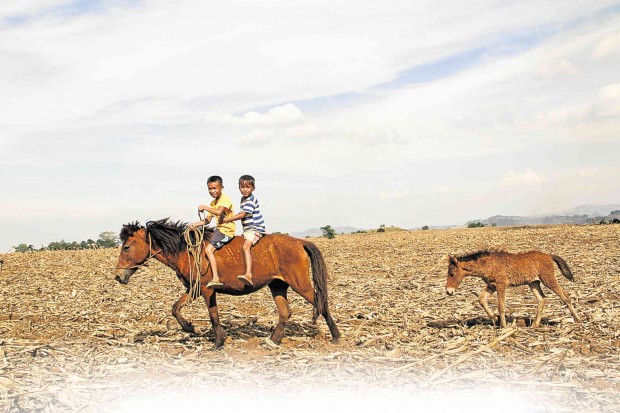Selflessness shines as El Niño dries up crops, hope in village

TWO BOYS take a horseback ride on farms that had turned brown in the town of South Upi in Maguindanao province, which is suffering from the effects of the El Niño phenomenon. One of the villages suffering heavily from the drought is Tukanalipao in the town of Mamasapano, which has yet to recover from the bloodshed that led to the deaths of more than 50 people, including 44 elite policemen, in an operation to get international terrorist Marwan. DENNIS JAY SANTOS/INQUIRER MINDANAO
MAMASAPANO, Maguindanao—Fatima Sandigan and her family are used to hardship in the village of Tukanalipao, which had been placed on the map by one of the bloodiest debacles suffered by the government in the war on terror.
They thought they had struck bottom and had been prepared to stay there for good when 44 elite policemen, 17 Moro rebels and four civilians were killed in the operation to capture or kill international terrorist Marwan.
But the depth of Fatima and her family’s hardship has not settled yet. Things soon turned to worse.
Fatima’s husband was among the civilians killed in the bloodshed that came with the operation to get Marwan and Fatima had to take his place in the corn fields.
“My husband used to take care of us,” Fatima said. Work on the corn field doesn’t pay much. Fatima earns P30 per sack of shucked corn. Though small, it gave Fatima hope. Until El Niño started to dry this up, too.
“Now we are worried because the corn fields are dying,” said Fatima, 30, mother of three.
Like most areas of Maguindanao, a province that prides itself with hundreds of kilometers of rivers and hundreds of hectares of marshland, this town was not spared from the onslaught of the dry spell.
Residents of Tukanalipao, like Fatima, have barely anything to survive on. But this did not stop them from giving.
“We give what we can to those who need it the most,” said Warda Dagadas, 32, also resident of Tukanalipao.
“Sometimes we give rice, sometimes we give sugar, sometimes we take care of the children while the mothers are out to look for work,” said Warda.
The London-based aid group Oxfam, however, warned that the worst is yet to come.
“As El Niño begins to peak, women fear that there will be nothing left to harvest from their rice and corn fields, as irrigation facilities are starting to dry up,” said Lyca Sarenas, Oxfam conflict transformation programme manager.
“The drop in harvest will definitely push them deeper into poverty with no other source of food or income,” said Sarenas.
“They can’t afford to dwell on grief from last year’s tragedy as they have to move on and survive,” she added.
Farmers said it was as if nature is playing a cruel joke on them.
Farmer Zaharimim Amilil said whatever the dry spell left of their farms, rats have cleaned up.
Aliman Lintang, 65, has barely returned to his cornfield when the drought struck and rats ate crops in Tukanalipao and nearby villages.
Kulot Sarip, 60, a widow, said many farmers feed families on scarce provisions of staple food that villagers share among themselves.
For others, looking for jobs in other areas is the appropriate thing to do, even if they have to leave children behind.
“She felt that it was the only way that her children can have a better life,” said Salama Masinggan of daughter, Sara Langayen, who sought work abroad.
Sarah, 20, has two daughters by husband Badrudin, one of the fatalities of the bloodshed in Mamasapano.
In other areas of Maguindanao, the Tukanalipao situation mirrors that of the entire town and province.
Wild monkeys, which are normally elusive and stayed out of human settlements in the past, have been showing up on the highway in Barangay Taviran in Datu Odin Sinsuat town as the thick green forest there had turned brown due to the dry spell. Nash Maulana, Edwin Fernandez and Charlie Senase, Inquirer Mindanao














